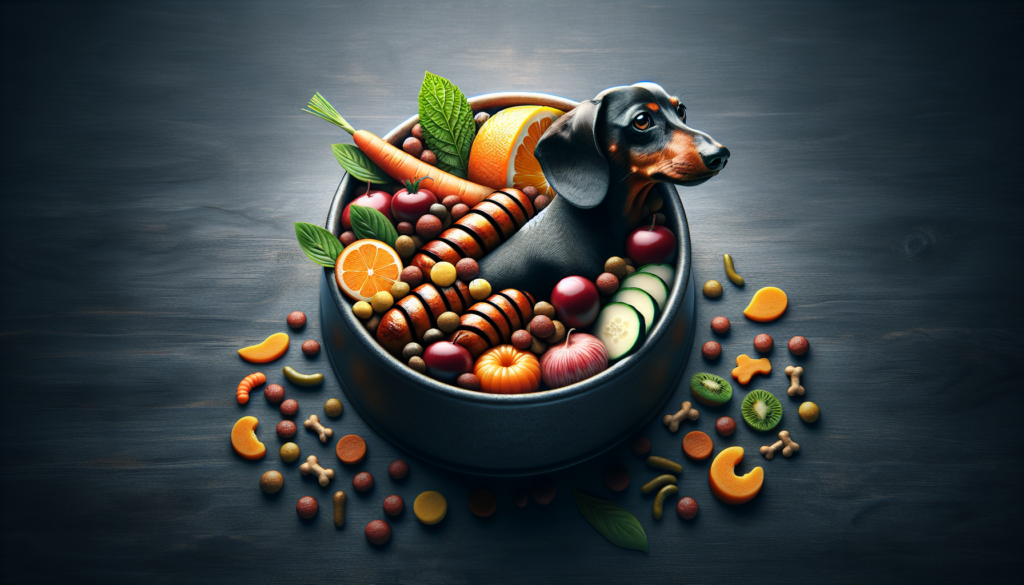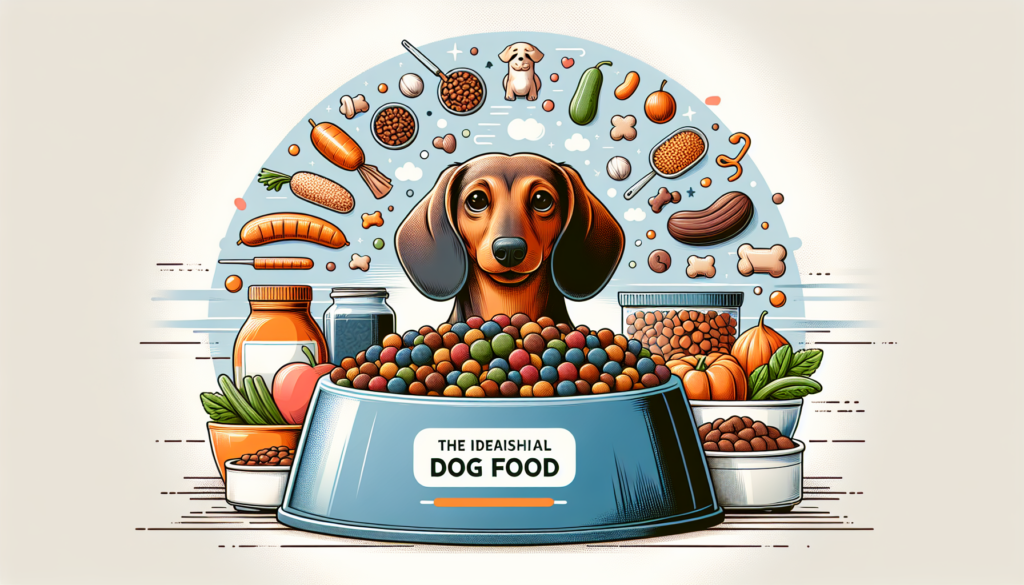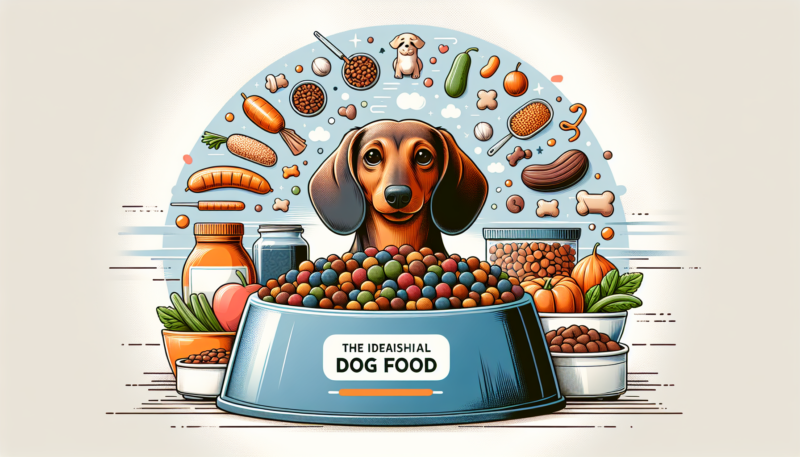Are you a proud owner of a Dachshund? If so, you know firsthand how important it is to provide your furry friend with the best nutrition possible. In this article, we will explore the world of dog food specifically formulated for Dachshunds. From their unique nutritional needs to the top brands available, we will guide you in finding the best dog food for your beloved pup. So, get ready to discover the key to keeping your Dachshund healthy and happy!
Factors to Consider for Dachshund’s Nutritional Needs
Dachshunds are a unique and lovable breed with specific nutritional needs that should be taken into consideration when selecting their dog food. Several factors play a role in determining the appropriate diet for your Dachshund, including their age and life stage, activity level, size and weight, any potential food allergies or sensitivities, and any existing health conditions they may have.
Age and Life Stage
Just like humans, Dachshunds have different nutritional requirements depending on their age and life stage. Puppies require a diet that is rich in nutrients and protein to support their growing bodies. As they mature, their nutritional needs change, and they may require specialized formulas for adult dogs or senior dogs. Always consult with your veterinarian to ensure your Dachshund is receiving the right balance of nutrients for their specific life stage.
Activity Level
The activity level of your Dachshund should also be taken into account when selecting their dog food. Dachshunds are known for their lively and energetic nature, but individual activity levels can vary. If your Dachshund is highly active, they may require a higher calorie intake to fuel their energy levels. Conversely, if your Dachshund is more sedentary, they may need a lower-calorie diet to prevent weight gain. Adjusting their food portions accordingly can help maintain a healthy weight.
Size and Weight
As a small breed, Dachshunds have different nutritional needs than larger dog breeds. It’s important to select a dog food formula that is appropriate for their size and weight. Smaller kibble sizes are easier for Dachshunds to chew and digest, and formulas specifically designed for small breeds can provide the right balance of nutrients for their unique requirements.
Food Allergies and Sensitivities
Some Dachshunds may develop food allergies or sensitivities to certain ingredients. Common allergens for dogs include chicken, beef, dairy, and grains. If you notice signs of allergies like itching, gastrointestinal issues, or skin irritations, it may be necessary to switch to a hypoallergenic or limited ingredient diet. Eliminating the offending ingredient can help alleviate your Dachshund’s symptoms and promote overall well-being.
Health Conditions
Dachshunds are prone to certain health conditions, such as obesity, back problems, and intervertebral disc disease (IVDD). These conditions can greatly impact their dietary needs. For example, overweight Dachshunds may require a weight management formula with lower calories to help shed excess pounds. Dachshunds with back issues may benefit from joint health formulas that support their spinal health. If your Dachshund has any existing health conditions, it’s crucial to consult with your veterinarian to determine the most suitable diet for their specific needs.
Decoding Dachshund’s Dietary Requirements
Understanding the specific dietary requirements of Dachshunds is essential for ensuring their overall health and well-being. While every Dachshund is unique, there are several key factors to consider when it comes to their nutritional needs.
Protein Content
Protein plays a crucial role in the diet of a Dachshund. It provides the necessary amino acids for muscle growth and repair, and supports various bodily functions. Look for a dog food formula that contains high-quality sources of animal protein, such as chicken, turkey, or fish. Avoid formulas that rely heavily on plant-based protein sources, as they may not provide the same level of nutrition.
Caloric Needs
Dachshunds have relatively high metabolisms, making their caloric needs greater compared to some other small dog breeds. It’s important to feed them a diet that provides the right amount of calories to maintain a healthy weight. Working with your veterinarian to determine the appropriate calorie intake for your Dachshund based on their activity level and size is crucial to avoid underfeeding or overfeeding.
Fat Content
Fat is an essential component of a Dachshund’s diet and provides a concentrated source of energy. It also aids in the absorption of fat-soluble vitamins. However, it’s important to choose a dog food formula that contains moderate levels of fat, as excessive amounts can lead to weight gain and obesity. Look for formulas that include healthy fats, such as omega-3 fatty acids, which can promote a healthy coat and skin.
Carbohydrates
Carbohydrates provide energy and can be an important part of a Dachshund’s diet. Look for dog food formulas that include easily digestible carbohydrates, such as sweet potatoes or brown rice. Avoid formulas that contain excessive amounts of fillers or low-quality carbohydrates, as they may contribute to weight gain and digestive issues.
Fiber Content
Fiber is essential for maintaining healthy digestion in Dachshunds. It aids in regulating bowel movements and can prevent issues such as constipation. Look for dog food formulas that contain a moderate amount of fiber, derived from ingredients such as fruits, vegetables, or whole grains. However, be cautious not to exceed the recommended fiber levels, as excessive amounts can lead to digestive upset.

Commercial Dog Food Options for Dachshunds
When it comes to choosing a commercial dog food for your Dachshund, there are several options available that cater specifically to their nutritional needs. Here are some recommended formulas to consider:
Small Breed-Specific Formulas
Small breed-specific formulas are designed to meet the unique nutritional requirements of smaller dogs, such as Dachshunds. These formulas typically include smaller kibble sizes, higher protein content, and the right balance of nutrients to promote overall health and well-being.
Weight Management Formulas
Weight management formulas are ideal for Dachshunds who may be prone to weight gain or are already overweight. These formulas typically have lower calorie content and higher fiber content to help your Dachshund maintain a healthy weight and promote satiety.
Joint Health Formulas
Dachshunds are prone to back problems and joint issues, making joint health formulas an excellent option. These formulas often contain ingredients like glucosamine and chondroitin, which support joint health and mobility.
Sensitive Stomach Formulas
If your Dachshund has a sensitive stomach or is prone to digestive issues, consider selecting a dog food formula that is specifically formulated for sensitive stomachs. These formulas usually contain easily digestible ingredients and are gentle on the digestive system.
Limited Ingredient Formulas
For Dachshunds with known food allergies or sensitivities, limited ingredient formulas can be a great option. These formulas contain a minimal number of high-quality ingredients, making it easier to identify and eliminate potential allergens from their diet.
Homemade Dog Food Recipes for Dachshunds
If you prefer to prepare homemade dog food for your Dachshund, there are several nutritious and delicious recipes that you can try. Here are a few homemade dog food recipes specifically tailored for Dachshunds:
Chicken and Brown Rice Recipe
Ingredients:
- 1 cup cooked chicken, diced
- 1/2 cup cooked brown rice
- 1/4 cup peas, cooked
- 1/4 cup carrots, cooked and diced
- 1/4 cup green beans, cooked and chopped
Instructions:
- In a mixing bowl, combine all the ingredients.
- Stir well to ensure that the ingredients are evenly distributed.
- Serve the chicken and brown rice mixture to your Dachshund in appropriate portion sizes.
Turkey and Sweet Potato Recipe
Ingredients:
- 1 cup cooked turkey, shredded
- 1/2 cup cooked sweet potato, mashed
- 1/4 cup spinach, cooked and chopped
- 1/4 cup pumpkin puree
- 1 tablespoon olive oil
Instructions:
- In a mixing bowl, combine all the ingredients.
- Mix well to ensure that the ingredients are thoroughly combined.
- Serve the turkey and sweet potato mixture to your Dachshund in appropriate portion sizes.
Salmon and Quinoa Recipe
Ingredients:
- 1 cup cooked salmon, flaked
- 1/2 cup cooked quinoa
- 1/4 cup broccoli, steamed and chopped
- 1/4 cup carrots, cooked and diced
- 1/4 cup blueberries
Instructions:
- In a mixing bowl, combine all the ingredients.
- Mix well to ensure that the ingredients are evenly distributed.
- Serve the salmon and quinoa mixture to your Dachshund in appropriate portion sizes.
Beef and Barley Recipe
Ingredients:
- 1 cup cooked lean ground beef
- 1/2 cup cooked barley
- 1/4 cup green peas, cooked
- 1/4 cup carrots, cooked and diced
- 1/4 cup pumpkin puree
Instructions:
- In a mixing bowl, combine all the ingredients.
- Stir well to ensure that the ingredients are thoroughly mixed.
- Serve the beef and barley mixture to your Dachshund in appropriate portion sizes.
Veggie Delight Recipe
Ingredients:
- 1/2 cup cooked lentils
- 1/2 cup cooked sweet potato, mashed
- 1/4 cup spinach, cooked and chopped
- 1/4 cup carrots, cooked and diced
- 1/4 cup zucchini, cooked and diced
Instructions:
- In a mixing bowl, combine all the ingredients.
- Mix well to ensure that the ingredients are evenly combined.
- Serve the veggie delight mixture to your Dachshund in appropriate portion sizes.

Choosing the Best Dog Food for Dachshunds
Selecting the best dog food for your Dachshund can be a challenging task, considering the wide variety of options available in the market. Here are some factors to consider when making your decision:
Reading Dog Food Labels
When evaluating dog food options, it’s important to read and understand the information provided on the labels. Look for dog food formulas that contain high-quality ingredients and avoid those that contain excessive fillers, by-products, or artificial ingredients. The label should clearly indicate the main protein source and list the specific ingredients used.
Quality Ingredients
Opt for dog food formulas that use high-quality ingredients, such as real meat, whole grains, fruits, and vegetables. Avoid formulas that use generic terms like “meat meal” or “animal by-products,” as they may not provide the same level of nutrition.
Avoidance of Fillers and By-Products
Fillers and by-products are low-quality ingredients that offer little nutritional value for your Dachshund. Be cautious of dog food formulas that contain excessive amounts of fillers, such as corn, wheat, or soy. By-products are also best avoided, as they can consist of low-quality or undesirable parts of animals.
Seeking Veterinary Advice
Consulting with your veterinarian is crucial when selecting the best dog food for your Dachshund. They can provide valuable insights and recommend specific formulas that cater to your Dachshund’s unique needs. Your veterinarian can also help address any specific health concerns or dietary requirements your Dachshund may have.
Considering Brand Reputation
When choosing a dog food brand, consider their reputation in the industry. Opt for well-established brands known for their commitment to quality and rigorous testing processes. Brands that have been recommended or endorsed by veterinarians or have positive customer reviews are typically more reliable choices.
Transitioning to a New Dog Food
If you decide to switch your Dachshund’s dog food, it’s important to do so gradually to avoid digestive upset. Here are some steps to follow when transitioning to a new dog food:
Gradual Transition Process
Start by introducing small amounts of the new dog food into your Dachshund’s current food. Begin with around 25% of the new food mixed with 75% of the old food. Gradually increase the proportion of the new food while decreasing the old food over a period of 7-10 days.
Monitoring Digestive Health
Observe your Dachshund’s digestive health during the transition period. Look out for any signs of diarrhea, vomiting, or excessive gas. If these symptoms persist or worsen, consult with your veterinarian, as it may indicate an intolerance or sensitivity to the new food.
Adjusting Portion Sizes
When switching to a new dog food, it’s important to reassess your Dachshund’s portion sizes. The caloric content and nutrient composition of the new food may differ from their previous diet. Consult with your veterinarian to ensure you are feeding the appropriate amount to maintain a healthy weight.
Transitional Period Duration
The duration of the transitional period may vary depending on your Dachshund’s individual needs and tolerance. Some dogs may adapt quickly, while others may require a more extended transition period. Monitor your Dachshund’s response to the new food and adjust the transition duration as needed.
Seeking Veterinary Guidance
If you have any concerns or questions about transitioning to a new dog food, don’t hesitate to seek guidance from your veterinarian. They can provide personalized advice based on your Dachshund’s specific needs and ensure a smooth transition to the new diet.
Common Health Issues in Dachshunds
Dachshunds are susceptible to several common health issues. While nutrition alone cannot prevent or cure these conditions, it can play a vital role in their overall health and well-being. Here are some health issues to be aware of:
Obesity
Dachshunds are prone to obesity, which can lead to various health problems, including joint issues, diabetes, and heart disease. Feeding a balanced diet and monitoring portion sizes are essential for maintaining a healthy weight in your Dachshund.
Back Problems
Dachshunds are at a higher risk of back problems, such as intervertebral disc disease (IVDD). Their long spine and short legs make them more susceptible to spinal issues. Providing a diet that supports joint and spine health, along with regular exercise, can help minimize the risk of back problems.
Intervertebral Disc Disease (IVDD)
IVDD occurs when the discs in the spine degenerate or become herniated, causing pain and mobility issues. While nutrition cannot prevent IVDD, feeding a diet that supports joint health and maintaining a healthy weight can help reduce the risk or severity of this condition.
Joint Issues
Dachshunds can develop joint issues, such as arthritis or hip dysplasia. Feeding a diet formulated for joint health, along with regular exercise and weight management, can help support their joint function and mobility.
Allergies and Skin Conditions
Dachshunds may develop food allergies or sensitivities, leading to skin irritations, itching, or gastrointestinal problems. Identifying and eliminating the allergen from their diet can help alleviate these issues. Working with your veterinarian to determine the appropriate diet for your Dachshund’s specific needs is crucial.
Special Dietary Considerations for Dachshunds
Given the breed-specific health concerns of Dachshunds, there are certain dietary considerations that can help support their overall health and well-being. Here are some important factors to keep in mind:
Weight Management
Maintaining a healthy weight is crucial for Dachshunds to prevent obesity and associated health issues. Feed them an appropriate portion size and select a dog food formula that supports weight management, if necessary.
Bone and Joint Health
Dachshunds are prone to back problems and joint issues. Choose a dog food formula that includes ingredients like glucosamine and chondroitin to support their bone and joint health. Regular exercise and weight management are also important for maintaining good joint function.
Digestive Health
Some Dachshunds may have sensitive stomachs or be prone to digestive issues. Select a dog food formula that is gentle on the digestive system, with easily digestible ingredients. Avoid foods that contain potential allergens or irritants.
Food Allergies
Dachshunds can develop food allergies or sensitivities to certain ingredients. If you suspect that your Dachshund has a food allergy, consult with your veterinarian to determine the specific allergen and switch to a hypoallergenic or limited ingredient diet.
Skin and Coat Health
A healthy diet plays an important role in maintaining your Dachshund’s skin and coat health. Look for dog food formulas that include essential fatty acids, such as omega-3 and omega-6, to promote a shiny coat and healthy skin.
FAQs about Feeding Dachshunds
Here are some frequently asked questions about feeding Dachshunds:
How often should I feed my Dachshund?
Dachshunds are generally fed two meals per day, evenly spaced out. However, the specific feeding schedule may vary depending on your Dachshund’s age, activity level, and individual needs. Consult with your veterinarian to determine the most suitable feeding schedule for your Dachshund.
Should I free-feed or use specific meal times?
Most Dachshunds benefit from being fed specific meal times rather than free-feeding. Meal times help regulate their caloric intake and establish a feeding routine. However, consult with your veterinarian to determine the best feeding method for your Dachshund based on their individual needs.
Can Dachshunds eat human food?
While some human foods can be safe for Dachshunds, it’s important to exercise caution. Certain human foods, such as chocolate, grapes, onions, and caffeine, can be toxic to dogs. Always consult with your veterinarian before sharing any human food with your Dachshund to ensure its safety.
What foods are toxic to Dachshunds?
Several foods are toxic to Dachshunds and should be avoided completely. These include chocolate, grapes and raisins, onions and garlic, caffeine, alcohol, and certain artificial sweeteners, such as xylitol. To keep your Dachshund safe, it’s important to be aware of these toxic foods and keep them out of reach.
What are the signs of food allergies in Dachshunds?
Signs of food allergies in Dachshunds can vary but commonly include itching, redness or swelling of the skin, gastrointestinal issues (vomiting or diarrhea), paw chewing, ear infections, or excessive licking. If you suspect that your Dachshund may have a food allergy, consult with your veterinarian to determine the underlying cause and appropriate treatment plan.
Conclusion
Taking into account the specific nutritional needs of Dachshunds is essential for their overall health and well-being. By considering factors such as age and life stage, activity level, size and weight, food allergies and sensitivities, and existing health conditions, you can make informed decisions regarding their diet. Whether you opt for a commercial dog food formula specially formulated for Dachshunds or choose to prepare homemade dog food, always prioritize quality ingredients, avoid fillers and by-products, and seek veterinary advice when needed. With the right diet and proper care, you can ensure that your Dachshund lives a happy and healthy life.
